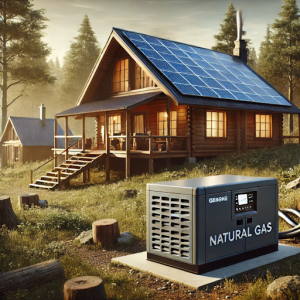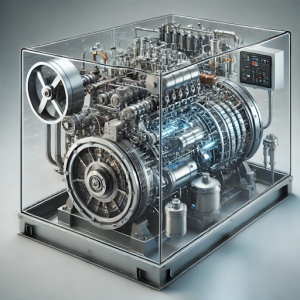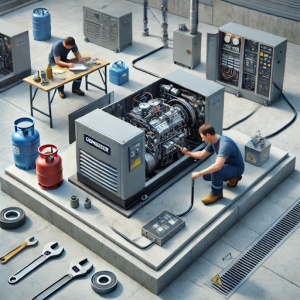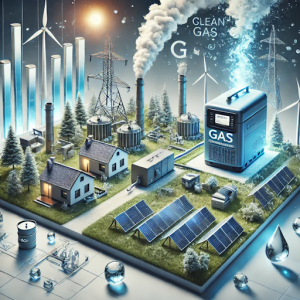Discover How Natural Gas Generators Enhance Sustainable Off-Grid Living
For individuals aspiring to achieve a reliable power supply in remote homes or cabins, natural gas generators emerge as an exceptional choice. To embark on a successful off-grid journey, it’s essential to understand the various methods of power generation available. Natural gas generators offer distinct advantages, including consistent reliability, cost-effectiveness, and eco-friendly characteristics. These features make them particularly appealing to enthusiasts of off-grid living who prioritize both sustainability and energy efficiency in their lifestyle.
In today’s technology-driven landscape, the allure of off-grid living has gained significant traction. Whether your motivation stems from a desire for sustainability, a quest for independence, or the pursuit of a self-sufficient lifestyle, disconnecting from traditional power grids can be immensely rewarding. Off-grid power solutions empower individuals to harness energy from renewable resources or alternative fuels, facilitating a comfortable living experience without dependence on conventional electricity sources.
Equipping yourself with the necessary knowledge and preparation allows for seamless integration of a natural gas generator into your off-grid lifestyle. This ensures that your vital energy needs are consistently met with a dependable power supply. This article will delve into the myriad advantages of natural gas generators, clarify their operational mechanics, and highlight critical considerations when selecting and installing these systems for your off-grid setup.
 Key Insights to Empower Your Off-Grid Power Solutions
Key Insights to Empower Your Off-Grid Power Solutions
- Embrace off-grid power solutions to free yourself from traditional energy sources, making them indispensable for remote living or during unforeseen power outages.
- Natural gas generators deliver reliable and efficient energy production, boasting significantly lower emissions compared to diesel or gasoline options.
- These generators operate by combusting natural gas to generate mechanical energy, which is subsequently converted into electrical energy through a generator system.
- When selecting a natural gas generator, it is essential to evaluate parameters such as power output, fuel efficiency, and maintenance requirements to ensure optimal performance.
- Proper installation and regular maintenance are critical for the efficient and safe operation of your natural gas generator.
Uncover the Unique Benefits of Natural Gas Generators for Power Generation
One standout feature of natural gas generators is their remarkable reliability. By choosing a natural gas generator for your off-grid energy needs, you can expect a steady power supply tailored to your specific requirements. Unlike solar panels or wind turbines, which can be negatively impacted by weather conditions, natural gas generators provide stable energy output, unaffected by external elements.
This reliability is particularly vital for those relying on electricity for essential functions such as heating, refrigeration, or operating critical medical equipment. The assurance that your generator will deliver power exactly when you need it most brings invaluable peace of mind. Beyond their reliability, natural gas generators also offer significant cost savings.
Although the initial investment may exceed that of some alternative off-grid options, the long-term savings can be substantial. Natural gas is commonly more economical than gasoline or diesel, resulting in decreased operational costs over time. Furthermore, the maintenance demands of natural gas generators are generally less rigorous than those of other types, allowing you to save both time and resources while enjoying a dependable energy source.
 Understanding the Operational Mechanics of Natural Gas Generators
Understanding the Operational Mechanics of Natural Gas Generators
Natural gas generators operate by converting the chemical energy inherent in natural gas into electrical energy through a combustion process. When the generator is activated, natural gas is combined with air and ignited within the engine’s combustion chamber. This ignition generates high-pressure gases that propel the engine’s pistons, ultimately turning the rotor of the generator and producing electricity.
This operational method is noteworthy for its efficiency, as it is cleaner compared to other fossil fuel options. A crucial component of a natural gas generator is its fuel system, which typically includes a regulator that controls the gas flow to ensure optimal performance. Modern natural gas generators often feature advanced technologies such as automatic start/stop functions and remote monitoring capabilities.
These innovations greatly enhance user convenience, allowing you to manage your power supply more effectively and simplifying your off-grid lifestyle.
Essential Considerations for Selecting the Right Natural Gas Generator
| Consideration | Description |
|---|---|
| Power Output | Assess the generator’s required power output based on the appliances and equipment you intend to operate. |
| Fuel Type | Opt for natural gas as your fuel choice due to its clean-burning and cost-effective properties. |
| Size and Portability | Choose a generator size and level of portability that suit your available space and mobility requirements. |
| Noise Level | Evaluate the generator’s noise output to ensure it meets acceptable standards for your living environment. |
| Start-up Mechanism | Choose between manual or automatic start-up options based on your convenience and usage frequency. |
When selecting a natural gas generator for your off-grid arrangement, several critical factors must be considered. Firstly, evaluate your power requirements. Calculate the total wattage necessary to support your essential appliances and devices, ensuring that your chosen generator can handle the load effectively.
It is generally advisable to select a generator with a slightly higher capacity than your calculated needs to accommodate any sudden increases in power demand. Another vital aspect to consider is the generator’s portability and installation requirements. If you plan to frequently relocate your generator or use it in multiple locations, seek a model that is lightweight and easily transportable.
Moreover, consider whether you prefer a stationary installation or a portable unit that can be conveniently set up as needed. Lastly, pay attention to the generator’s noise level; quieter models can enhance your off-grid experience by minimizing disturbances and preserving the tranquility of your natural surroundings.
 Best Practices for the Effective Installation and Maintenance of Natural Gas Generators
Best Practices for the Effective Installation and Maintenance of Natural Gas Generators
The installation of a natural gas generator requires careful planning and execution to ensure both safety and efficiency. Begin by selecting a suitable location for your generator, ensuring compliance with local regulations and safety guidelines. Ideally, this site should be well-ventilated and sufficiently distanced from flammable materials.
You may also need to install a concrete pad or platform to provide stability and protect the generator from moisture-related damage. Once you have identified the optimal location, connect the generator to your natural gas supply line. If you lack experience with gas line installations, it’s advisable to seek professional assistance to guarantee compliance with all safety standards.
After establishing the fuel connection, set up the necessary electrical connections to integrate the generator with your home’s electrical system. Regular maintenance is essential for ensuring your generator operates smoothly over time. This includes routine oil level checks, air filter replacements, and spark plug inspections to maintain peak performance.
Cost Analysis: Natural Gas Generators Compared to Other Off-Grid Power Solutions
When evaluating the costs associated with off-grid energy solutions, conducting a detailed comparison between natural gas generators and alternative options like solar panels and diesel generators is crucial. Although solar energy systems are increasingly popular due to their renewable nature, they often necessitate a substantial initial investment in panels, batteries, and inverters. Furthermore, solar systems may struggle to deliver sufficient power during overcast days or at night without adequate battery storage.
On the other hand, diesel generators are recognized for their reliability but typically incur higher fuel costs and more frequent maintenance than natural gas generators. Given that diesel fuel prices can fluctuate significantly, natural gas often presents a more stable and frequently lower-cost option in many regions. A comprehensive long-term expense analysis indicates that natural gas generators generally offer a more economical solution for individuals pursuing off-grid living.
 Assessing the Environmental Impact of Natural Gas Generators in Off-Grid Living
Assessing the Environmental Impact of Natural Gas Generators in Off-Grid Living
As you explore your off-grid energy options, it’s vital to evaluate their environmental impact. Natural gas is frequently highlighted as a cleaner alternative to other fossil fuels, such as coal or oil, due to its reduced carbon emissions during the combustion process. By opting for a natural gas generator, you can significantly decrease your carbon footprint while enjoying reliable power for your off-grid lifestyle.
Nevertheless, it is essential to recognize that natural gas remains a fossil fuel, and its extraction may have environmental repercussions. Methane leaks during the extraction and transportation processes present substantial challenges concerning greenhouse gas emissions. To mitigate such concerns, prioritize sourcing natural gas from reputable suppliers that are committed to sustainable practices.
Additionally, integrating renewable energy sources alongside your natural gas generator can further demonstrate your commitment to environmental sustainability and responsible energy consumption.
Inspiring Real-Life Success Stories of Off-Grid Power Solutions with Natural Gas Generators
Examining real-world examples offers valuable insights into the effective use of natural gas generators in off-grid living scenarios. For example, numerous rural homeowners have made successful transitions to natural gas generators as their primary energy source after experiencing frequent outages from traditional utility services. The adoption of these generators has granted them energy independence while ensuring reliable electricity for heating, cooling, and essential appliances.
Another compelling case study involves remote cabins that utilize natural gas generators for seasonal use. Due to their isolated locations, these cabins often lack access to conventional power sources. Natural gas generators allow cabin owners to enjoy modern conveniences, such as refrigeration and lighting, without sacrificing their connection to the natural environment.
These success stories illustrate how natural gas generators can effectively support off-grid living, delivering both comfort and reliability. As you embark on your off-grid journey, contemplate the extensive benefits that natural gas generators provide. From their reliability and cost-effectiveness to their relatively low environmental impact, these generators can play a pivotal role in achieving energy independence.
By carefully choosing the right model for your requirements and adhering to proper installation and maintenance procedures, you can smoothly transition into an off-grid lifestyle powered by natural gas.
Addressing Frequently Asked Questions About Natural Gas Generators
What characterizes a natural gas generator for off-grid applications?
A natural gas generator for off-grid living is a power generation system that utilizes natural gas as a fuel source to produce electricity in remote locations where access to the main power grid is limited or unavailable.
How does a natural gas generator function for off-grid use?
A natural gas generator designed for off-grid applications operates by combusting natural gas within an internal combustion engine. This process generates mechanical energy, which is then converted into electrical energy via a generator. The electricity produced can power various appliances, equipment, and lighting in off-grid settings.
What are the primary advantages of utilizing a natural gas generator in off-grid living?
Key benefits of using a natural gas generator for off-grid living include:
– Lower fuel expenses compared to diesel or gasoline generators
– Cleaner combustion that leads to reduced emissions
– Continuous fuel supply sourced from natural gas pipelines
– Lower maintenance requirements compared to other fuel types
What factors should you consider when using a natural gas generator for off-grid living?
Important considerations when utilizing a natural gas generator in off-grid situations include:
– Availability of natural gas supply in your area
– Initial installation and equipment costs
– Regular maintenance and servicing requirements
– Environmental implications and compliance with emissions regulations
Is the use of a natural gas generator off-grid feasible for residential and commercial purposes?
Natural gas generators intended for off-grid use are suitable for both residential and commercial applications. They are commonly employed in remote homes, cabins, farms, and small businesses lacking connectivity to the main power grid.
The post Natural Gas Generators for Off-Grid Power Solutions appeared first on Survival Bite.
The Article Natural Gas Generators: Your Off-Grid Power Solution Was Found On https://limitsofstrategy.com




Comments are closed